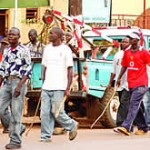New links between govt & “Kiboko Squad” emerge
By Timothy Nsubuga – 2nd-8th Aug 2010
The mystery that has surrounded the command structure and indeed purpose of the infamous “Kiboko Squad” militia for months may be about to be unravelled. Investigations conducted by Uganda Correspondent over the last few weeks have established a very strong link between Maj. General Kale Kayihura’s Uganda Police Force, the Uganda People’s Defence Force, and the “Kiboko Squad” militia that has been tormenting Ugandan opposition activists with impunity. But let’s first remind ourselves how the “Kiboko Squad” made their unglamorous debut.
The Grand Entrance
The chosen occasion was the “Mabira Riots”! That was of course the time when hundreds, perhaps even thousands of Ugandans led by FDC’s tough talking Beatrice Anywar MP aka “Mama Mabira” took to the streets of the capital Kampala to protest the government’s proposal to give away parts of Mabira forest to SCOUL, a sugar manufacturing company.
Their entrance into the murky world of Ugandan politics and the regime’s revolutionary style of “maintaining law and order” in the country was dramatic. Dressed in civilian clothes and operating alongside uniformed regular police officers, the “Kiboko Squad”, a rag-tag cane wielding militia descended upon the Mabira protestors and literally whipped them off the streets.
At the time, there were media reports that suggested that the “Kiboko Squad” had emerged from behind the building that houses the Central Police Station in Kampala.
Subsequent Operations
Since the initial “Mabira Riots”, the “Kiboko Squad” have continued to terrorise opposition activists under the watchful eye of police officers. They attacked and beat up IPC’s “Women of Peace” who have been agitating for the disbandment of the Kiggundu-led Electoral Commission; they attacked and beat up members of the National Alliance of Free and Fair Elections; and they even had the audacity to beat up Dr. Kizza Besigye, the president of FDC, the largest opposition party in Uganda.
The State Denials
Uganda’s Inspector General of Police Maj. Gen. Kale Kayihura has however consistently distanced his force from the “Kiboko Squad”. He has maintained that his force doesn’t know the “Kiboko Squad” and that a team has been set up to investigate their operations. Kayihura’s seriously questionable theory about the “Kiboko Squad” is that it is “…illegal demonstrations in towns that force business people to resort to deploying their own security to protect their property” and that as a result, they “…end up caning unruly demonstrators”.
President Museveni himself has come tantalising close to defending the “Kiboko Squad”; arguing that they are justified in beating up opposition politicians who “tell lies” as well as rioters who disrupt business in the Central Business District.
The Smoking Gun
Well today, for the very first time, Uganda Correspondent can exclusively reveal that its investigations have uncovered strong evidence that suggests that both the Uganda Police Force and the Uganda People’s Defence Force are inextricably linked to the “Kiboko Squad”.
A source that is close to the top leadership of Uganda Police who spoke to Uganda Correspondent on condition of strict anonymity, expressed surprise at the fact that the command structure of the “Kiboko Squad” is still a matter of public debate. “I am surprised that people still doubt the link between the state and the “Kiboko Squad”; he said.
He then added that, “…I can tell you for a fact that the sticks that the “Kiboko Squad” use to beat up opposition activists are harvested from Kalinju forest in Bushenyi District-Western Uganda”.
The “Kiboko Squad”, the source said, “…is actually made up of officers serving in both the Uganda Police Force and the Uganda People’s Defence Force who dress up in civilian clothes for every operation against the opposition and other rioters”.
And then, for the real “smoking gun” that might well seal the case against Museveni’s government and its involvement with the “Kiboko Squad”, our source further revealed that the overall commander in charge of “Kiboko Squad” operations is a police officer who, for his “good work against opposition protesters”, has been rapidly promoted and now holds the rank of a full Commissioner of Police. That, our source says, “is a rock solid fact. Many Ugandans in Kampala actually know who that police Commissioner is”.
So clearly, it cannot be the case that both Museveni’s government and our source are telling the truth. What is not in doubt is that at the very least, a strong prima facie case has been established for Museveni’s government to answer. In this “Kiboko Squad” case, the rules of the game will have to change: In other words, the accused Museveni government will have to prove its innocence.
![]()


